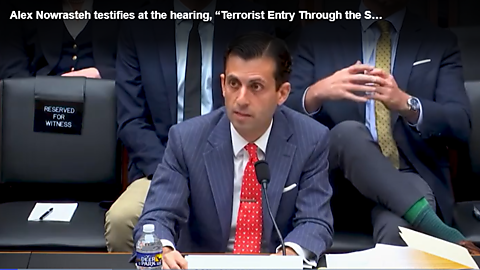
Alex Nowrasteh
Yesterday, I testified at the “Terrorist Entry Through the Southwest Border” hearing before the House Subcommittee on Immigration Integrity, Security, and Enforcement. You can watch the entire hearing here, my spoken testimony here, and highlights here. My written testimony is here. This was an excellent opportunity to highlight my research on foreign‐born terrorism in the United States.
Inspired by John Mueller’s pathbreaking work to quantitatively estimate the risk posed by terrorism, I adapted his methods to estimate the threat posed by foreign‐born and native‐born terrorists in response to the policy issues in the 2016 election and during much of the Trump administration. I updated the terrorism and immigration risk analysis last month, but this is just a tiny sample of my work on this topic.
I testified that zero Americans have been injured or killed in terrorist attacks by illegal immigrants or asylum seekers who entered through the southwest border. Indeed, there have been zero terrorist attacks on U.S. soil by illegal immigrants or asylum seekers who crossed that border.
However, nine foreign‐born terrorists have entered the United States illegally since 1975. Three convicted illegal immigrant terrorists crossed the U.S.-Mexico border. They are Dritan Duka, Eljvir Duka, and Shain Duka, and they entered illegally in 1984 when they were aged 5, 3, and 1, respectively. They were arrested in 2007 while plotting to attack Fort Dix. Of the other illegal immigrant terrorists, five illegally crossed the U.S.-Canada border, and one was a stowaway on a ship.
Over the 1975–2022 period, the chance of being murdered in an attack by a foreign‐born terrorist was about 1 in 4.3 million per year. That is no comfort to the actual victims of foreign‐born terrorism, nor should it ever be construed as comfort. The rarity of foreign‐born terrorism does not diminish the death or injury of the victims and the suffering it causes their families. But the rarity of such attacks means that pain, injury, and death are mercifully uncommon. The U.S. government has an obligation to intercept foreign‐born terrorists and to prevent their entry into the United States.
The rarity of terrorism and the death and destruction it causes should guide public policy. The quantity of taxpayer resources and the types of restrictions on individual liberty that have been enacted to counter the threat of foreign‐born terrorism is grossly disproportionate to the risk, like it is for all counterterrorism spending.
At a minimum, the government has an obligation to use taxpayer resources wisely so that expenditures pass a cost‐benefit test. That bare minimum has not been met in counterterrorism or in many other areas.
Below is my opening statement to the subcommittee.
Chairman McClintock, Ranking Member Jayapal, and distinguished members of the subcommittee, thank you for the opportunity to testify. Over many decades, the Cato Institute has produced original research on immigration and sober evaluations of the realistic threat of foreign‐born terrorism.
Terrorism is a serious topic, so serious that we should focus laser‐like on data and facts. We cannot let ourselves be distracted by fiction or speculation. This focus on data and facts requires looking at the past, which is the source of all data about terrorism. The title of this hearing is “Terrorist Entry Through the Southwest Border.” When I first heard that was the title, my reaction was, “What terrorist entry through the southwest border?”
Zero people have been murdered in attacks committed by terrorists who entered as illegal immigrants. Zero people have been injured in attacks committed by terrorists who entered illegally. Zero attacks have been carried out by immigrants who entered illegally.
Nine terrorists have entered the United States illegally. Five of them illegally crossed the U.S.-Canada border, one was a stowaway on a ship, and three of them, Dritan Duka, Eljvir Duka, and Shain Duka, entered illegally through the U.S.-Mexico border in 1984. At the time of entry, Dritan Duka was five years old, Eljvir Duka was three years old, and Shain Duka was one year old. In 2007, they were convicted as part of the Fort Dix plot, which was broken up by law enforcement during the planning stage.
Zero asylum seekers who became terrorists entered through the U.S.-Mexico border. Thirteen terrorists have entered as asylum seekers, and they are responsible for nine murders and about 669 injuries in attacks on U.S. soil, but none of them crossed the southwest border.
There have been zero terrorist attacks by illegal border crossers who were flagged by the Terrorism Screening Database (also called the watchlist). Federal prosecutors have not filed charges related to a terrorist plot on U.S. soil against anyone who entered between a port of entry and who was flagged by the watchlist.
Almost all individuals listed on the watchlist are not terrorists. Data released to the Washington Examiner showed that 25 of the 27 watchlist hits encountered by Border Patrol in the first six months of 2022 were citizens of Colombia. If they were even members of Foreign Terrorist Organizations (FTO), they were likely members or former members of FARC, FARC offshoots, or other insurgents in Colombia.
There has never been a terrorist attack committed on U.S. soil by these Colombian FTOs, there is no publicly available evidence that they have ever intended to target the U.S. homeland, and no foreign‐born person from Colombia has ever committed, planned, attempted, or been convicted of attempting to commit terrorism on U.S. soil.
Special interest aliens (SIA) are a supposed terrorism concern along the U.S.-Mexico border. DHS has a fancy definition of SIA, but the reality is that the SIA designation is a label for “illegal immigrants from a country that could have terrorists” and nothing more. SIA is not a meaningful metric to understand the threat of terrorism along the border or anywhere else.
Although terrorists who crossed the U.S.-Mexico border have never murdered or injured anyone in a terrorist attack on U.S. soil, there is a chance that a foreign‐born terrorist could cross the U.S.-Mexico border and commit an attack in the future. The way to reduce that threat is to vastly expand legal immigration to diminish the number of illegal immigrants down to very low levels.
Such a liberalization and deregulation of immigration would allow Border Patrol to focus its efforts more fully on deterring security threats instead of trying to centrally plan international labor markets.
Thank you.






